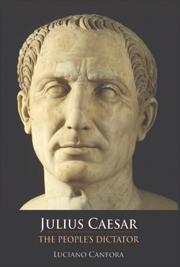Book contents
- Frontmatter
- Contents
- Translators' Note
- Acknowledgements
- Foreword
- PART I FROM SULLA TO CATILINE
- 1 In Flight from Sulla: First Experiences of an Aristocratic Youth
- 2 Prisoner of the Pirates (75–74 BC)
- 3 The Rise of a Party Leader
- 4 Pontifex Maximus
- 5 The ‘Affairs’ of Mr Julius Caesar and Others
- 6 The Political Market
- 7 Inside and Outside the Conspiracy
- 8 Caesar's Senate Speech Rewritten by Sallust
- PART II FROM THE TRIUMVIRATE TO THE CONQUEST OF GAUL
- PART III THE LONG CIVIL WAR
- PART IV FROM THE CONSPIRACY TO THE TRIUMPH OF CAESARISM
- Chronology
- Bibliography
- Index
5 - The ‘Affairs’ of Mr Julius Caesar and Others
from PART I - FROM SULLA TO CATILINE
Published online by Cambridge University Press: 05 August 2013
- Frontmatter
- Contents
- Translators' Note
- Acknowledgements
- Foreword
- PART I FROM SULLA TO CATILINE
- 1 In Flight from Sulla: First Experiences of an Aristocratic Youth
- 2 Prisoner of the Pirates (75–74 BC)
- 3 The Rise of a Party Leader
- 4 Pontifex Maximus
- 5 The ‘Affairs’ of Mr Julius Caesar and Others
- 6 The Political Market
- 7 Inside and Outside the Conspiracy
- 8 Caesar's Senate Speech Rewritten by Sallust
- PART II FROM THE TRIUMVIRATE TO THE CONQUEST OF GAUL
- PART III THE LONG CIVIL WAR
- PART IV FROM THE CONSPIRACY TO THE TRIUMPH OF CAESARISM
- Chronology
- Bibliography
- Index
Summary
The costs of these two hugely expensive election campaigns had exhausted Caesar's finances, and his debts were a continuing concern. He knew very well that the last resort of those beset by debts was civil war. When young men of his class utterly ruined by debt sought his assistance, if there was no other way to help them out of their difficulties, he replied with pitiless realism that ‘what they needed was civil war’. At first sight this seemed a paradoxical witticism, but it well illustrates an immediate connection in Caesar's mind: war as a response to debt and economic ruin for groups of the ruling classes who found themselves in serious difficulties. This line of thinking is not so remote from the idea which Asinius Pollio reports Caesar expressing to those close to him when he saw the vanquished at Pharsalus: ‘They would have it so. Even I, Gaius Caesar, after so many great deeds, should have been found guilty, if I had not turned to my army for help’. Asinius places much emphasis on this statement, which was another indication of the true motives that brought Caesar to the rift and subsequent civil war: Asinius plainly understood it to mean that Caesar was one of those young men for whom recourse to civil war was the last resort in extricating oneself from extreme personal difficulties.
- Type
- Chapter
- Information
- Julius CaesarThe People's Dictator, pp. 26 - 32Publisher: Edinburgh University PressPrint publication year: 2007

